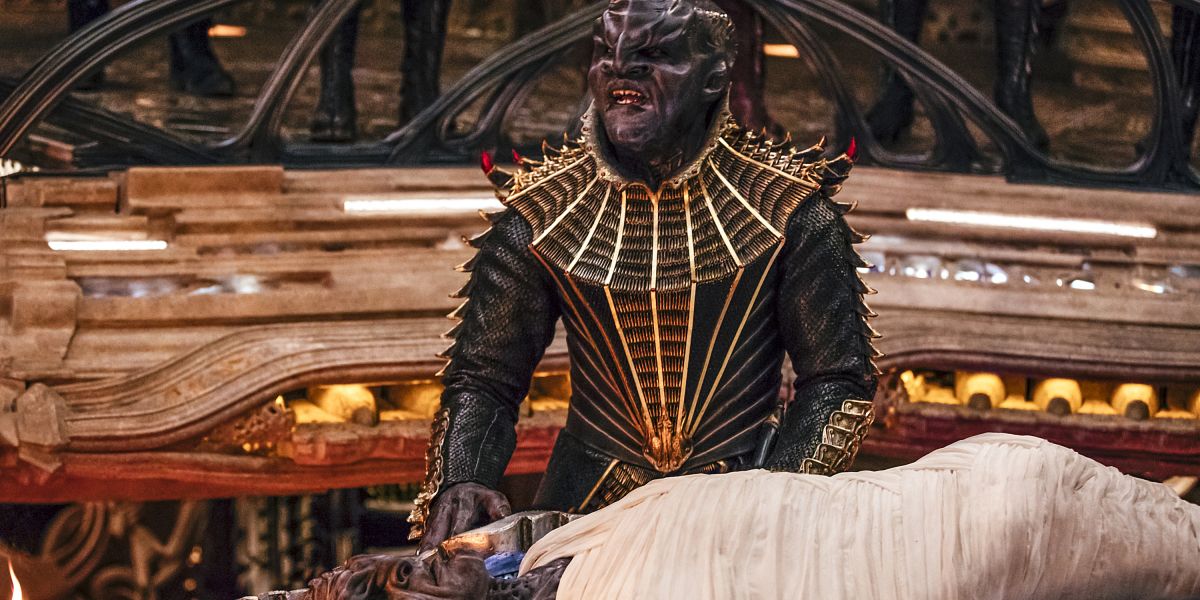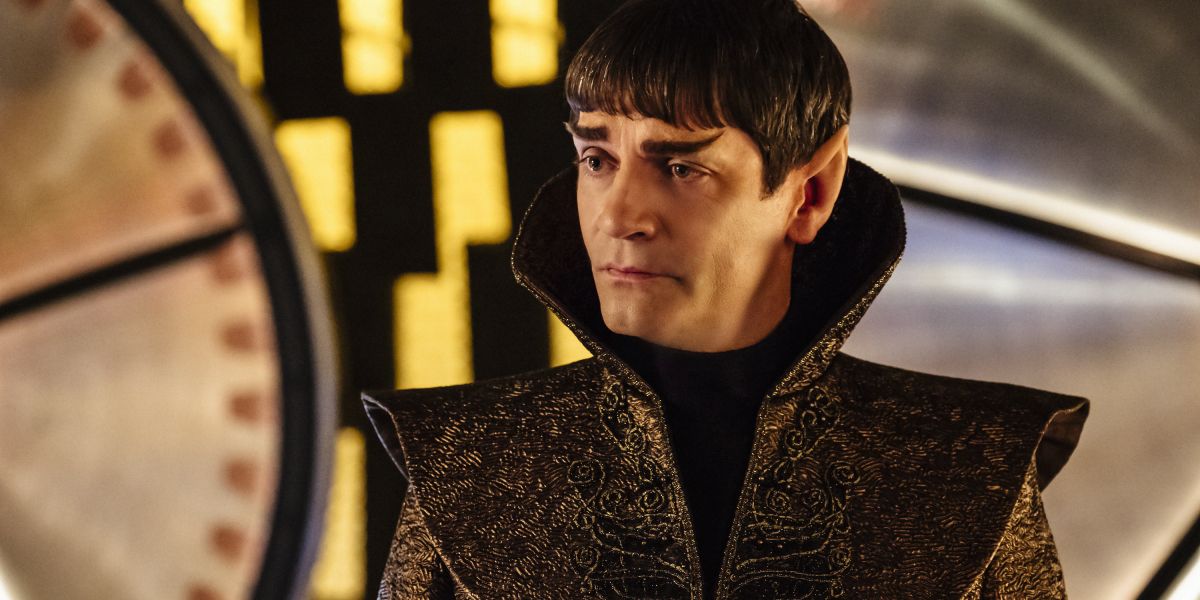Star Trek: Discovery begins with an effects-heavy premiere that puts the franchise somewhere between small-screen revival and theatrical blockbuster.
With CBS' Star Trek: Discovery the decades-spanning franchise created by Gene Roddenberry is back on television – perhaps the medium to which it is best suited. The new series is yet another spinoff of the classic Trek program, one where the mission to boldly go where no one has gone before is paramount to the crew manning the ship, which is the titular Discovery, rather than the Enterprise. But a change in space-faring vessels isn't the only thing that aims to distinguish the new series. For starters, it's a prequel, which isn't exactly new territory for the franchise, as it once put Scott Bakula at the helm of the ship bearing the same name as the one James T. Kirk would take to the farthest reaches of the galaxy. But Discovery is less about tracing the steps that gave Trek its start than it is blazing an entirely new trail of its own.
With a diverse cast headed up by Sonequa Martin-Green, Michelle Yeoh, and Jason Isaacs, Star Trek: Discovery feels like it splits the difference between classic Star Trek as a television series and the attempt to refashion Star Trek into a more contemporary theatrical blockbuster experience, as seen by the new trio of films spearheaded by Star Wars: The Force Awakens and future Episode IX director J.J. Abrams. As if that wasn't enough, as the new headlining act on the still-iffy digital subscription service CBS All Access, Discovery is also tasked with furthering the blockbusterization of television by promoting itself with lush visuals and a dark, complex, serialized storyline that puts it – initially, and in terms of expectations, anyway – in the uncomfortable position of having to indirectly compete in and with the television landscape as fashioned by Game of Thrones, TV's biggest spectacle.
In that sense, taking on HBO's mammoth series that's soon to be spun off in perpetuity just as Trek has been, 'The Vulcan Hello' and 'Battle at the Binary Stars' feel like CBS, as well as the Star Trek franchise itself, shooting for the stars. The future of All Access is likely to be determined by the success or failure of Discovery, but more than that, this new series feels like the future of Trek will be governed in large part by the choices made here. That's not to say Star Trek is in any danger of going anywhere. It will always exist in one for or another – there's a subpar version of it on FOX right now – but the path the franchise takes may well be shaped by the success or failure of the stories told aboard the Starship Discovery.
For the first two episodes, though, that titular ship is nowhere to be seen. Instead, the story unfolds almost entirely aboard the Shenzhou, following Martin-Green's First Officer Michael Burnham and Captain Philippa Georgiou, as a routine mission to repair a broken communications satellite leads to the first notable human interaction with Klingons in nearly a century. The result of that interaction is the all-out war that will fuel the first season's narrative and, more importantly, gives what is essentially a two-hour premiere (provided you're a CBS All Access customer or took advantage of the free trial to get the full two-parter) plenty of opportunities to showcase the kind of blockbuster effects and storytelling audiences and potential subscribers have come to expect from a subscription service.
If people are going to shell out money on yet another streaming platform, especially one that boasts primarily a library of network shows (i.e., stuff you already get as part of a basic TV package), there needs to be an appropriate incentive for them to do so. In the thinking of Star Trek: Discovery, that means presenting something that's unfamiliar to the CBS line-up: dark, serialized storytelling that's marked by copious amounts of impressive, visually appealing CGI. The premiere certainly delivered on the latter, as it presented one truly impressive vista – the shot of the binary star and asteroid field provided a stunning scenic backdrop against which the story could unfold – and then turned that view into a war zone with equally striking results.
But Discovery aims to be more than just visual spectacle, as it puts an early emphasis on not only Michael's relationship with Captain Georgiou but also with Sarek (James Frain), otherwise known as Spock's dad. The interpersonal dynamic between them is meant to underline the push-pull of the two parts of Michael's identity – human and Vulcan – and over the course of the first two hours, the seeds of a strong internal conflict are sown. With everything the premiere needs to establish, though, that conflict winds up feeling a tad unwieldy, as when Michael's actions confuse logic with emotion, it's just not the character who is uncertain but the writers as well. Hopefully, as the season progresses there'll be a clearer understanding of Michael's struggle to understand which part of her is dictating her response in any given situation.
Having a character like who is uncertain what drives her is good for this new series, though; just as having an antagonist who operates with absolute certainty makes for a more compelling premiere. In this case, T’Kumva attempts to unite the Klingons after generations of dysfunction by preaching an unfortunately topical kind of purity among his kind, inciting a war with the Federation and eventually becoming what Michael had feared most: a martyr for the Klingons and reason for them to continue fighting forever.
While T’Kumva's martyrdom isn't too much of a surprise, considering how it was foreshadowed earlier, his killing of Captain Georgiou does deliver something of a shock, as does the game-changing cliffhanger on which 'Battle at the Binary Stars' ends. With Michael sentenced to life in prison for staging a mutiny, and the titular Discovery never even making an appearance in the first two hours, Star Trek: Discovery's premiere is more like a prequel movie than it is a pilot episode. And that works in the shows favor – at least when it comes to the biggest reason for it to exist: to prop up CBS All Access.
In that sense, the launch of the series becomes a belated de facto launch of the streaming subscription service. The Good Fight gave CBS some solid brand recognition; Star Trek brings a devoted fan base and the potential for a Game of Thrones-like level of audience involvement, and this new series gave one reason after another for that audience to become loyal subscribers. The first CBS-airing hour ended in an abrupt cliffhanger, all but necessitating everyone switch over to All Access. But the real trick was delaying the start of the actual series until next week's third episode, 'Context is for Kings'.
For now, it's enough to appreciate CBS taking such a big swing and delivering an entertaining re-introduction to the long-running franchise, even though next week promises something very different. That's where Discovery will deliver the first look at the series' main ship and Jason Isaacs as Captain Lorca. It's also when the story will truly begin. It will be interesting to see if Star Trek: Discovery continues to push for blockbuster-sized spectacle week in and week out, or if the latest iteration of the franchise will settle into something else entirely.
Next: Star Trek: Discovery’s Captain Georgiou is Michael’s ‘Guardian’
Star Trek: Discovery continues next Sunday with 'Context is for Kings' on CBS All Access.



